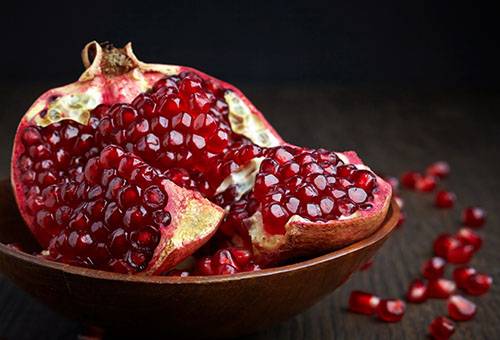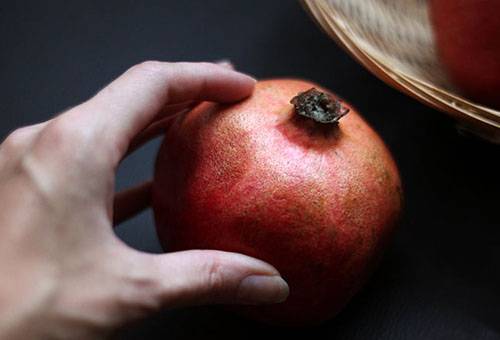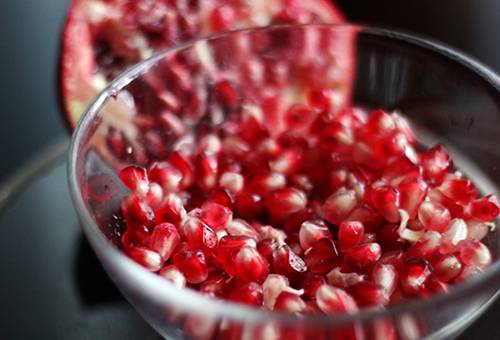How to properly preserve pomegranate at home for several months?
In autumn, store shelves are filled with juicy red fruits. The question of how to store pomegranate so that you can enjoy it in winter also becomes relevant. In addition, it is very useful, so in the cold season, when the body lacks vitamins, it has a particularly beneficial effect on health.

How to choose?
In order for pomegranate to be stored for a really long time, it is necessary to take a responsible approach to its choice. Any damage will significantly reduce the shelf life. The ripe fruit is very juicy inside, but its peel looks a little dried out. It is quite thin and seems to hug the grains. If the skin looks moist and elastic, then the fruit was most likely picked before it was ripe.
The color of the rind may vary from fruit to fruit. It can be light green, yellow, brown, red. The main thing is that the coloring should be uniform and uniform, with a slight glossy sheen. If brown or brown marks are visible, then the fruit is most likely spoiled due to black rot.
You can choose a truly ripe pomegranate if you pay attention to the cup of color on its crown. A good sign if it is dry and open. In an unripe fruit, such a “crown” is usually green. It is the ripened fruit that has the pulp around the grain that is truly tasty. Although if the pomegranate is a little unripe, it will ripen during storage.
How to prepare for storage?
So, high-quality grenades have been purchased, now it’s time to think about storing them.These fruits can last for a long time if suitable conditions are created for this. The place should be chosen depending on how long it will take to eat them. It could be:
- fridge;
- balcony;
- cellar;
- freezer.
Pomegranates are very juicy, but moisture evaporates from them during storage. This can be prevented by wrapping them in paper. If there are a lot of fruits, it is convenient to put them in a small box, covering them with paper. It will absorb evaporating liquid, which will prevent the appearance of rot. This means it will ensure long-term preservation.
You can preserve pomegranate at home if you fill the so-called “crown” with clay. This will also reduce moisture loss. You need to dilute the clay with water until the consistency of sour cream. Pour the resulting mixture over the remaining flower on the fruit. It will be ready for storage when the solution dries. As a result, the skin may dry out, but the grains themselves will remain juicy and aromatic. Unripe pomegranates will gradually ripen.
Advice
It is better to give preference to weighty pomegranates - they are juicy and without voids.
At what temperature should it be stored?
An important condition for long-term storage is temperature. Like most subtropical fruits, which include pomegranate, it is best stored at 1-2 degrees Celsius. The shelf life depends on the type. Sour varieties are stored for up to nine months, sweet varieties are stored for up to five months.
This is how long the fruits are stored in conditions close to freezing. But it’s not always possible to create them, so it’s often convenient to keep fruit in the refrigerator or on a glassed-in balcony. The cellar is also suitable for this purpose if it is dry. The temperature should be from 2 to 8 degrees.The fruit will remain suitable for consumption for two months. Every two weeks it is necessary to sort through them to prevent damage. If signs of rot appear on one of them, then it must be removed in order to save the rest.
The longest storage method is freezing. A pomegranate can last up to a year in the freezer. This is again influenced by the variety, as well as the original condition. But with this method, a fairly large part of the vitamins is lost, so it can hardly be called optimal. But if you come across a pomegranate with marks of rot, then you need to choose it. There is no need to freeze the whole grain, you need to peel it and put the grains in a bag. Damaged ones should be removed first. In addition, the pulp will take up less space than the whole fruit.
Pomegranate has many beneficial properties. It contains amino acids, vitamins, fiber, and minerals. The fruit has a positive effect on digestion, normalizes metabolic processes, and helps strengthen the immune system. Therefore, it is good to eat it not only in the fall, when it ripens. And to have this opportunity, it should be stored correctly. And then in the cold winter and even early spring there will be an opportunity to enjoy the exotic taste.

